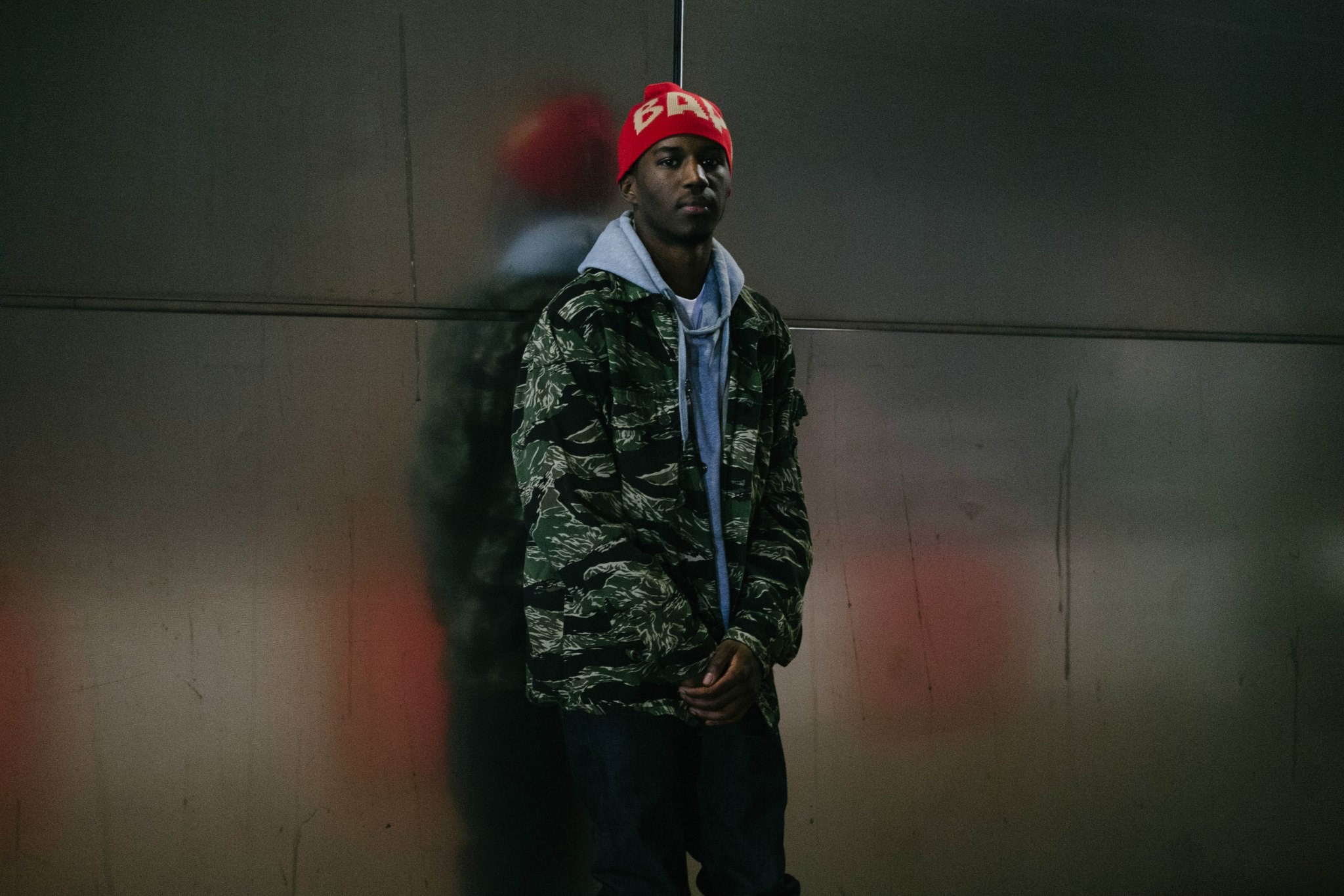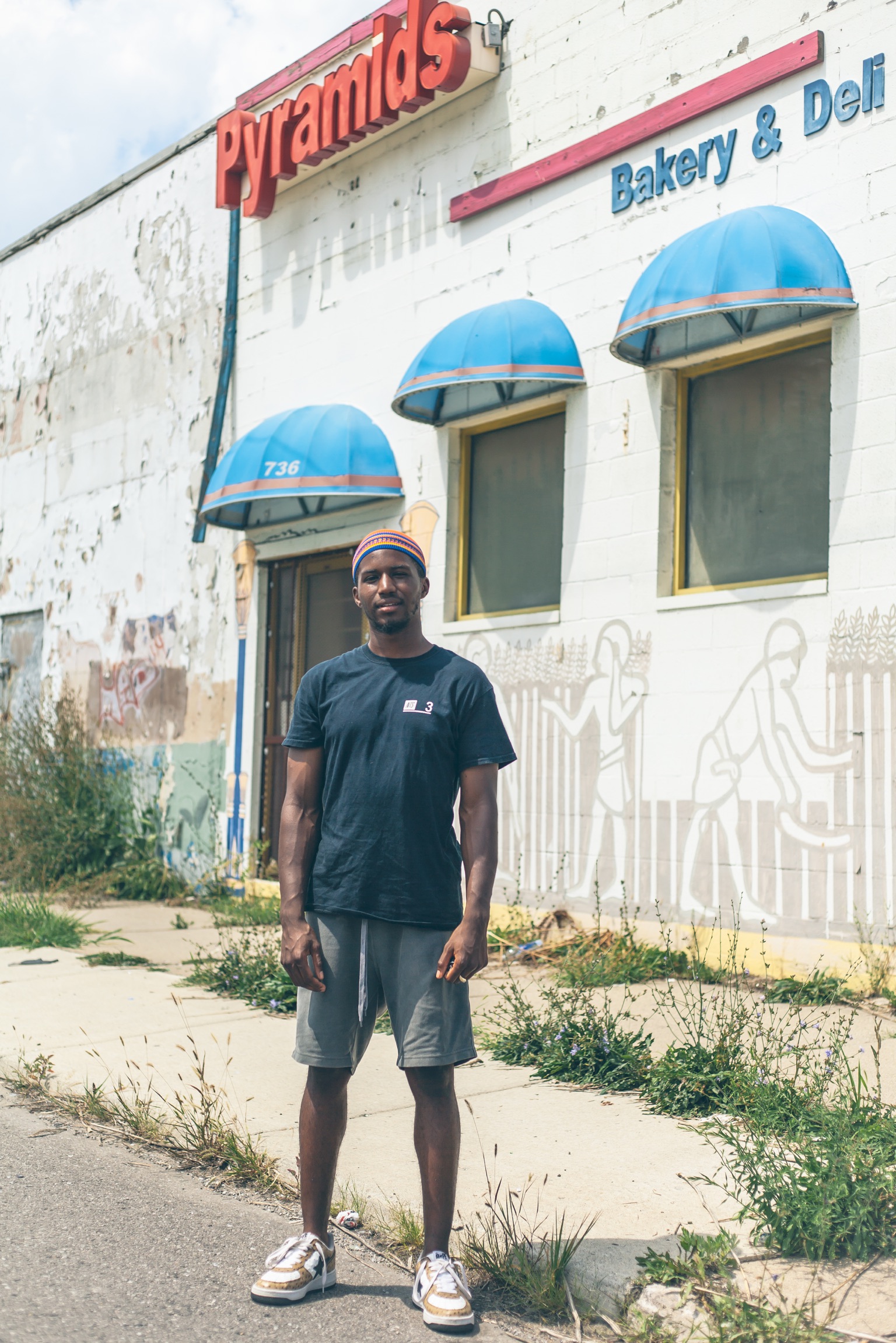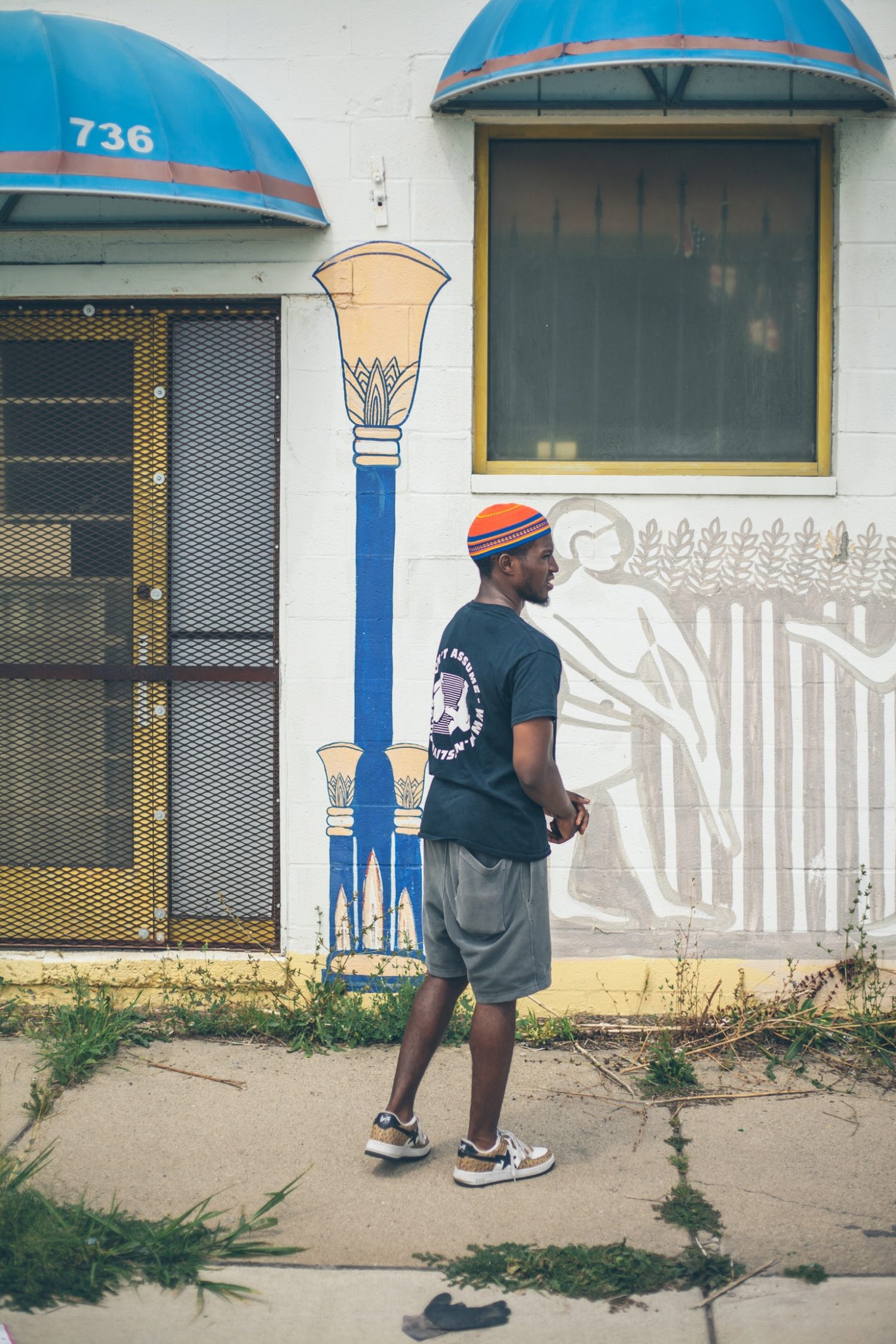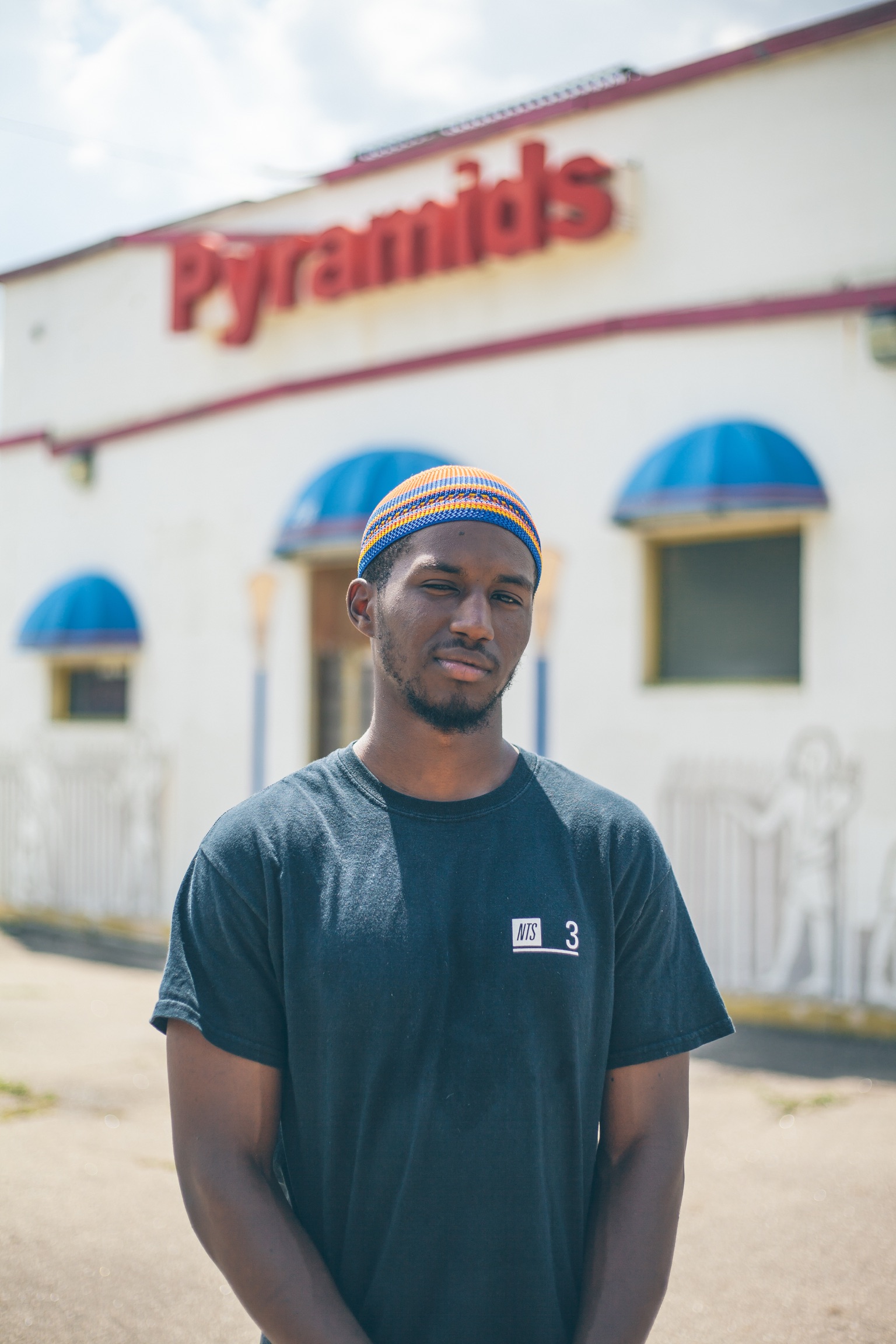Bubblin’ Up: Jay Daniel
One of Detroit's most promising artists muses on his thought-provoking debut album and career so far.

Bubblin’ Up: Jay Daniel
One of Detroit's most promising artists muses on his thought-provoking debut album and career so far.
Jay Daniel’s debut release, 2013’s Scorpio Rising EP, arrived just a few months after the young Detroit artist first picked up an MPC. Although it slightly lacked cohesion, the EP and its 2014 follow-up, Karmatic Equations, signaled to many that Daniel was well on his way to joining the long list of Detroit artists that have put their stamp on the global music scene. His style was rough and raw, but packed with emotive charm and a certain swagger that befits artists that early on in their production career.
Even though these first releases garnered much acclaim, Daniel avoided press and promotion. He wasn’t using aloofness as a bigger, thought-out plan of creating demand; rather, it was an absence of something to say. It’s clear that Daniel has an understanding that his most prominent voice is his art, and in the near-three years since the release of Karmatic Equations—besides a feature slot on Funkineven’s Discipline and the launch of Watusi High with School Dance—Daniel has been almost silent, working on his craft with careful consideration and patience.
The result of those years of work is now realized in Broken Knowz, Daniel’s beguiling debut album. Over the course of the release, Daniel almost eschews the dancefloor altogether; instead, he places his focus on deft rhythms—recorded with live drums into a multi-track mixer in his Mom’s basement—and highly emotive synth and piano lines. Although there are obvious dancefloor moments, Broken Knowz is an album that exists and thrives well outside of the club confines.
With the Broken Knowz now on the shelves, we dialed up Daniel at his home in Detroit to muse on the album’s stylings, the thought processes behind its theme, and where the Detroit upstart is headed.
Where were you born?
I was born in DC, moved to Detroit at three, then moved to Maryland with my Dad for five years during high school. I then moved back to Detroit.
What were your first forays into music and production?
Well, my dad is a drummer and a big music head and so is my mom, she’s a singer and has been involved in the industry and likes all kinds of music. She has a real eclectic taste. Music has always been around me since an early age. I haven’t had any formal training or music lessons or anything like that, though.
So when did you met Kyle Hall? I read that he was a catalyst to you getting more heavily into DJing and the house scene in general?
I met Kyle through a set of mutual friends who he went to high school with; I didn’t go to high school with Kyle but met him when I went back to Detroit.
I was already into DJing because of my mom actually. She put out that record in ‘93, so I was already aware of the culture of DJing but I was too young to get into it all before I moved back to Detroit. When I was younger, around 11, I met Carl Craig—before I moved from Detroit. My mom took me to meet him because I wanted to learn to DJ, but he was telling me about all the technical aspects of DJing which kind of deterred me. I was thinking, “This doesn’t sound fun at all.”
So DJing was the introduction. When did you start making music and producing?
It was 2013 that I started making music but I’ve been playing the drums since I was three years old because I played in my high school’s gospel choir. I guess that’s when I first started “making music,” but it was 2013 that I started producing on my own, and soon after that I released on Sound Signature.
For an artist that is now quite well known in the house scene, there is scarce information online about you. Has that been purposeful? Do you not feel comfortable in the limelight?
It’s not that I don’t feel comfortable; it’s just that I haven’t released enough music for people to be hip with me as a producer. The reason I haven’t been releasing much music is because I’ve been deterred by the business side of the music industry. Getting into it can be nasty; well, not even nasty, but there’s a lot of politics involved. People like to put their feelings first and I don’t like that. If you’re doing better than someone, people tend to hate and they like to throw salt on your game. It’s really been an unconscious thing, self-defacing would be a term, and not dumbing myself down for the sake of others. It’s not productive or progressive.
Not long after those first few releases came your label Watusi High. Did you create that specifically for your own releases or other artists as well?
I definitely want to work with other artists too—releasing other artists and collaborating with other artists. I want to present not only my ideas but other people’s ideas as well.
Will that be mostly Detroit artists?
Yeah, mostly artists from Detroit. I’m looking to release a few EPs this year on the label; one of them will be a collaboration with my boy Isamu, that’s one of the guys who went to high school with Kyle. We’ve been working on some stuff and it’s definitely not house music: it’s more world music, some hip-hop, just trying to defy genres.

Well, that leads into your debut album. I’ve been listening to it a lot lately and it’s hard to classify genre-wise. It’s quite “home listening,” for lack of better words. It’s not a club record. How long were you working on the ideas and production of the album?
A few of the tracks I had made prior to this year but the rest of them I made this year. It took me four-to-five months to really lock it all in.
And you recorded it into a multi-track mixer and recorded live drums. Would you then go and track in the keys and synth work on top?
Yeah, exactly. I would sometimes MIDI them up to the MPC and track them in like that.
Besides the drum kit and MPC, what other key pieces of gear did you use?
So it was the drums, MPC2500, a Fender Rhodes, an RX, and a Juno 106.
“I’m really trying to hone my musical ability to make stuff that people want to listen to when they aren’t at the club..”
What led you to release on Technicolour instead of your own label?
I just wanted to try something new and they reached out to me and I thought it would be a good opportunity to break the ice with this new loose sound. Everything prior to this release had been all club-based; DJ-friendly tracks rather than the “home listening” stuff like you said. I’m really trying to hone my musical ability to make stuff that people want to listen to when they aren’t at the club and just make music that’s not necessarily house or techno. The genre boundaries just get tiring after a while.
I found the name Broken Knowz and its reference to the Sphinx really interesting. Can you explain a little more on that?
It’s really about the commodification of intellectual property and creativity. I think there is a line drawn where black artists are appreciated and consumed only to a certain degree. I think it’s telling of our current political situation and everything at the moment. It was just tapping into all of that; Broken Knowz refers to the knowledge that has been taken from Africa.
It’s certainly telling of the times. I feel like this year, well the last few years in general, there is a big need for artists willing to publicly push these issues into the public’s conscious and to look under the covers.
Well, a lot of people ignore it for their own personal benefit, you know, “ignorance is bliss.” In order to tap into it, you have to be aware that things aren’t as they are supposed to be; and that goes hand in hand with protecting privileges that certain people have over others. It’s not in their best interest to give up their privilege because it works to their advantage to keep it that way. That’s also what the title is about, how music is marketed and commodified for capital growth. It all leads to attaining more capital and not for actual creative benefit, or for the sake of putting people on to a new sound. A lot of what is going on with the music game, just how it is being covered and everything, is done to create hype. It’s just weird to me because it’s counterproductive.
There’s always someone higher up that is just looking to make money from artists rather than pushing the art forward.
Exactly. It comes down to branding. That’s really what it is.
Yeah, how can I make a brand out of this artist or their art. It’s also magnified with the social media craze and the internet.
And that’s where cultural appropriation comes into play because sometimes people think that it belongs to everybody because they have access to it via the Internet and stuff like that. People end up exploiting the art, whether intentionally or unintentionally, it just always becomes the case.

Detroit was ground zero for house and techno and many other musical developments, and it seems that the city has always been subject to that commodification. People are always coming in and making money from the city but not giving back to it, or the people and its artists.
Exactly. Especially now, people have made Detroit out to be such a defunct and decrepit city. Sometimes when I’m overseas people will ask me, “Do people even live there?” I mean, come on. But now that’s playing out in the favor of the people that are coming to “invest in the city.” They are actually gentrifying it and it’s in their best interest because they are like, “Well, you all weren’t doing anything with the city, so why are you complaining about us trying to come and put money into the city.” And it’s because they didn’t care three years ago; they weren’t trying to do anything then; but now that there is political gain to be made from it, all of a sudden they care.
I was talking to the guy who runs the record store here the other day and he was talking about how much Detroit has changed—it’s kind of crazy. It happened unexpectedly and kind of crept up on people, and you kinda have to think out of context, get out of your shoes and think how it used to be. And it’s nothing like it used to be.
In that regard, how do you perceive the current scene in Detroit, musically speaking?
I think the scene is disbanded across the ages and people are not being organized. There’s no real hub I would suggest to go to when people come here. There’s no real cultural hubs here like there was in the ’60s and ’70s. Which is weird but it goes with the same idea that people have a conquer and divide mentality. So I would even say that there isn’t really a scene here. I mean, there are many people who are creative and are working to create all the time, but I think a real scene for me would include community activism; people that are doing stuff for the benefit of the people living here, rather than an ego driven opportunistic perspective. Trying to milk the scene and the city.
” I want to do something with the youth soon but it’s about solidifying myself as an artist first, and I’m on the pathway to doing that, I think.”
Is that something that you’re trying to work towards—cultivating a scene and working with younger artists?
Yeah, of course, but it’s step by step. Every release I put out and everything I do is a step towards that. The younger artists are the most important part in cultivating anything. If you put them onto a certain standard of creating and carrying themselves, then that flows to the next generation, and so on. I want to do something with the youth soon but it’s about solidifying myself as an artist first, and I’m on the pathway to doing that, I think.
It seems like there was a solid generational gap from the guys that pioneered the whole scene to yourself and Kyle and this younger generation.
Yeah, and I think that comes from closing that generational gap. The reason that house music isn’t as popular with our generation is that the older generation had this highbrow view of house music and it was very exclusive, so it reached the point where the people that live here didn’t even know that it the music started here. They always look at it as some European type of music. I mean, we play more in Europe than we play here, which is kinda telling. It’s about continuing the musical legacy so that people understand. I would rather that we disband this thought that it’s house music or electronic music and make it just music. It doesn’t have to be hip-hop over here and house over there, you know?
That relates back to Broken Knowz too, it has obvious influences from across the musical spectrum and is hard to classify. It’s about bringing it back to the essence of music.
It’s integral to becoming an artist. I was watching this Boiler Room with Tony Allen and he was saying that back in his day when he was coming up you had to be able to play all kinds of music: afro-beat, highlife, jazz, funk, all of it—that’s what it takes to become a musician. You can’t just master one area of funk and then be like, I’m a musician.
Have you been consciously practising that yourself, whether it’s drumming, or the keys. Do you set out to just practise different styles?
Yeah, just practising for the sake of practising. I’d go into the studio and not even touch the MPC, I’d just be content with practising other areas. Just really getting my creative expression out.
“Music is so subjective; sometimes people might think they are giving you advice but they are really be giving you opinions and if you take that with an unfiltered ear, then it can work against you.”
So who were some of the influences for you early on in your career? Were there any mentors?
I think I’ve always just kind of been my own mentor, really. There are tips and thoughts people have given me but it doesn’t always come from musicians, it could be an elder or someone younger and it just translates into music one way or another as far as problem-solving and stuff like that. Music is so subjective; sometimes people might think they are giving you advice but they are really be giving you opinions and if you take that with an unfiltered ear, then it can work against you.
Do you have tour plans for the album?
Yeah, the album comes out Friday and I’m having a release party at Piramida Sound—that’s a record store here in Detroit. Then I have a bunch more parties here in Detroit, they are all on my SoundCloud I’m also playing in Paris and London next month.
The album has such a live feel to it. Are there plans for a live show in the future?
Definitely, yeah, it’s leading up to that. I’m trying to incorporate other artists and get back to the essence of playing with musicians. I think that’s another disadvantage of DJing: it’s solitary, it promotes individualism rather than creative collaboration.
So it’s something you’re working towards currently?
Yeah, I’m working towards it for sure. I’m just going to keep on practising and it might happen in a year from now, two years, maybe less. In the meantime I’m just going to keep making music and stay proactive.
Is there anything else on the horizon?
I’ve been reading a lot more lately and I think I’d like to do something in the creative writing realm, but that might be under a different name if I were to do it. The main thing has to be to cultivate my craft and get better gear and sound quality in order to convey my message more clearly.

Broken Knowz definitely has a sleeker sound to it than previous releases.
Yeah, it’s more musical and less beat-oriented.
Which is funny to say because most of the album is focused on drums and rhythm, but it doesn’t seem like it.
That’s because I have experienced more of life and honed my craft more. Like when Karmatic Equations and Scorpio Rising came out I had just started making music. Both of those were made in that first year of making music, so I was exploring myself and the techniques; whereas now, I’m a bit more versed in the rest of my areas and the sound has matured.
It definitely feels much more emotive and tells a deeper story on your emotions and where you’re at now.
Yeah, it’s a complete thought rather than statements or catchphrases.
So you’re gravitating towards music that isn’t so much dancefloor-based?
I will always incorporate danceable records into my repertoire; but at the same time, I’m definitely wanting to make more thought-provoking music that makes people question things about themselves and society. I’m trying to also incorporate more forms of art and make it more of an experience. You asked me earlier why I chose Ninja Tune: I feel because Technicolour is a part of Ninja Tune it’s a good vehicle and vessel to reach more people.
So is that how you approached this album? Looking at the artwork, the name and the music as a whole?
Yeah, for sure. I had the name in my head for a while. I thought of it and it was catchy and I wrote it down and finally I had enough tracks that sounded like it to me. My wife took that picture of me on my iPhone and it wasn’t until later that we were looking at it and she said to me that we should use that and it connected with me straight way. It’s ambiguous but also says something and it was what tied it all together.

